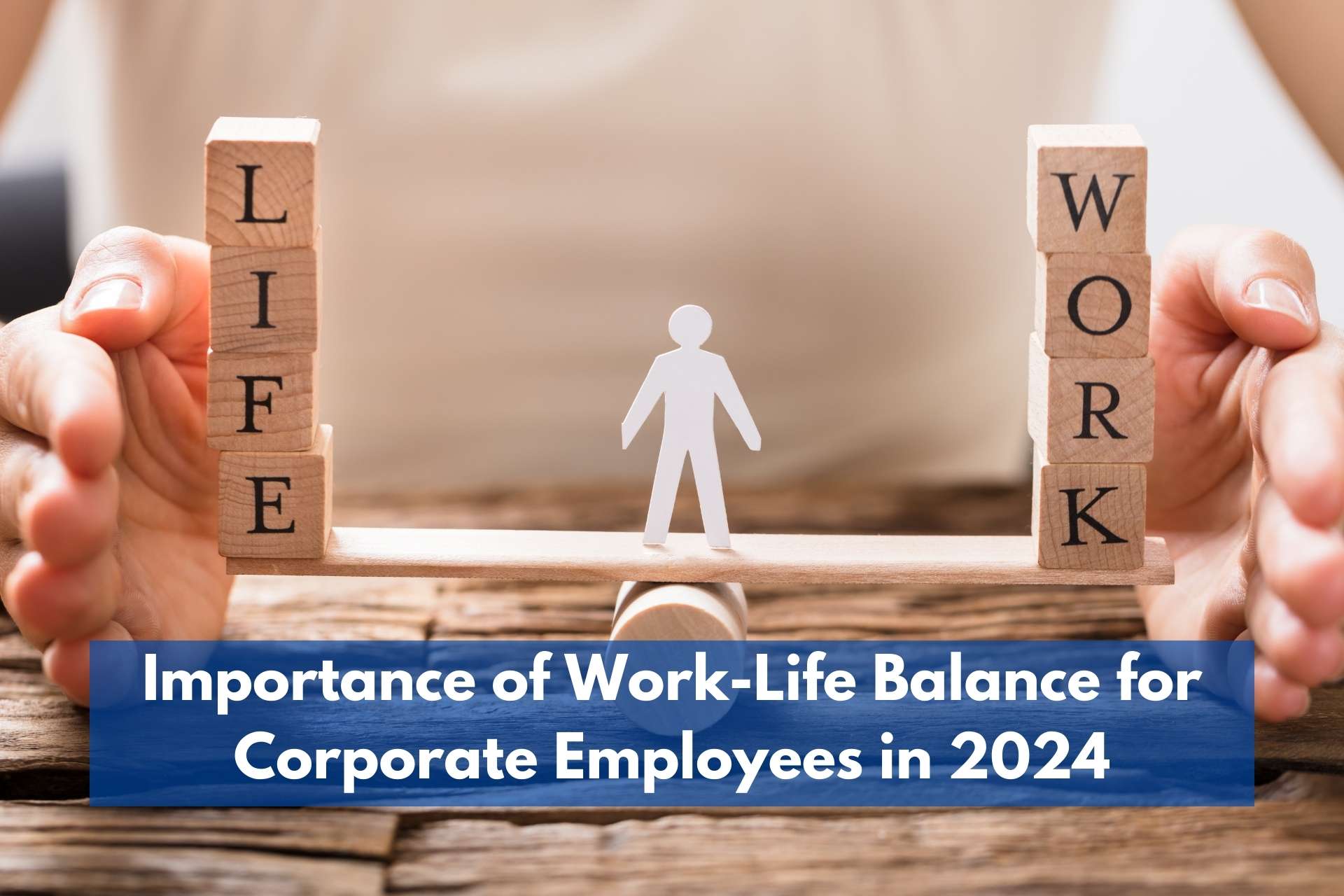Importance of Work-Life Balance for Corporate Employees in 2024

In 2024, work-life balance has become more important than ever, especially for corporate employees. As the boundaries between work and personal life continue to blur with technological advancements and remote working options, maintaining a healthy balance has turned into a critical factor for success and well-being. For employees, balancing professional responsibilities with personal needs is essential to avoid burnout, maintain productivity, and ensure long-term career satisfaction. This article explores why work-life balance is important for corporate employees and offers practical tips on how to achieve it.
Why Work-Life Balance is Important?
Mental and Physical Health
When corporate employees are constantly overwhelmed by work pressure, their mental and physical health takes a toll. Long working hours, high expectations, and a lack of personal time can lead to stress, anxiety, and even burnout.
Over time, these pressures can affect overall health, leading to issues like headaches, fatigue, or serious illnesses such as heart disease. Maintaining a good balance between work and personal life helps employees unwind, relax, and stay healthy, both physically and mentally.
Increased Productivity
While it may seem like working long hours means getting more done, the opposite is often true. Overworked employees are less productive and less focused.
A good work-life balance allows employees to recharge, resulting in higher energy levels, increased concentration, and improved performance at work.
When employees are well-rested and not consumed by work outside of office hours, they can approach tasks with more enthusiasm and efficiency.
Job Satisfaction
Work-life balance is directly linked to job satisfaction. Employees who feel they can maintain a fulfilling personal life while meeting their professional responsibilities are generally happier at work.
Companies that prioritize work-life balance often see lower employee turnover rates, as employees are more likely to stay in roles where they feel valued and supported.
On the contrary, employees who are constantly working overtime without time for themselves often feel drained and unhappy, leading to dissatisfaction and, ultimately, seeking employment elsewhere.
Stronger Relationships
For corporate employees, long working hours often mean sacrificing time with family and friends. This can strain relationships and lead to feelings of isolation.
A good work-life balance allows employees to spend time with loved ones, strengthen their social bonds, and build a support system outside of work.
Strong personal relationships are essential for emotional well-being, helping employees to handle the challenges of their professional lives more effectively.
Workplace Morale
Companies that encourage work-life balance often experience higher morale among their employees. When people feel supported in their personal lives, they are more likely to be engaged and motivated at work.
Positive morale leads to better teamwork, a more pleasant work environment, and an overall increase in productivity. On the other hand, companies with poor work-life balance policies may experience lower morale, higher absenteeism, and frequent burnout.
How to Achieve Work-Life Balance in 2024
Achieving a healthy work-life balance may seem challenging, especially in the corporate world, but it’s not impossible. Here are some practical tips to help corporate employees strike that balance in 2024:
Set Boundaries
With remote working and always-on technology, it can be difficult to switch off from work. Setting clear boundaries is crucial. For example, avoid checking work emails after office hours or during weekends.
Communicate your availability to your team and ensure that personal time is respected. By creating clear separation between work and personal life, employees can avoid being overwhelmed by constant work demands.
Prioritize Tasks
Not all tasks need to be completed immediately. Learning to prioritize tasks can help employees manage their workload more efficiently. By focusing on urgent and important tasks first, employees can reduce unnecessary stress and prevent working long hours to meet deadlines. Planning and organizing your workday can make a huge difference in maintaining balance.
Take Breaks
It’s essential to take short breaks throughout the workday. Whether it’s stepping outside for fresh air, taking a quick walk, or grabbing a coffee, these breaks give your brain a rest and help you come back to tasks with a fresh perspective. Encouraging regular breaks helps employees stay focused, reduces fatigue, and improves overall productivity.
Use Vacation Days
Many employees hesitate to use their vacation days because they worry about falling behind or appearing less dedicated. However, time off is essential for recharging and maintaining mental health.
Make use of vacation days to completely disconnect from work and focus on relaxation. Companies that encourage their employees to take vacations often see improved morale and productivity when they return.
Flexible Working Hours
As more companies embrace flexible work arrangements, corporate employees should take advantage of the opportunity to create schedules that work best for them.
Flexible hours or remote work can allow employees to attend to personal matters while still meeting their professional obligations. For example, starting the workday earlier or later may help balance family commitments or personal interests.
Learn to Say No
One of the biggest challenges to work-life balance is overcommitting. Saying “yes” to every request can lead to an overwhelming workload and make it difficult to maintain personal time.
Learning to say “no” when necessary, or delegating tasks when appropriate, can help employees manage their workload and preserve their work-life balance.
Foster a Positive Workplace Culture Through Work-Life Balance
In 2024, achieving work-life balance is essential for corporate employees to maintain mental and physical health, improve productivity, and ensure long-term job satisfaction. By setting boundaries, prioritizing tasks, and taking breaks, employees can achieve a healthy balance between work and personal life. At the same time, companies that promote work-life balance will benefit from happier, more productive, and loyal employees.
Ultimately, work-life balance is key to fostering a positive, thriving workplace culture that supports both personal well-being and professional success.




